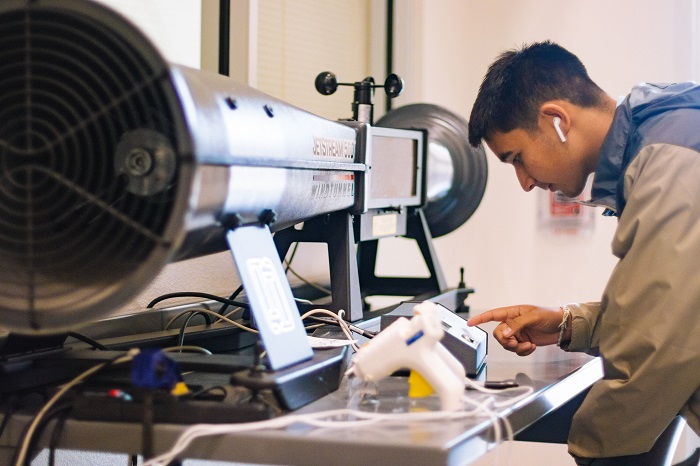The Knowledge Economy Evolution: Are We Preparing Young People for the New Age?

As we embark on a new year, we see that the world is continually changing in terms of technological advancement and innovation. What does that mean for young people who are preparing to move on up in the world?
The rapidly evolving new age means that they will face a lot of unknowns in their future. It’s more important than ever to set expectations and a plan of attack for young people who are leaving learning institutions and are about to encounter and engage with the knowledge economy.
What Is the Knowledge Economy, Anyway?
As the world progresses and we move into the future, our economy gets more and more knowledge-based – one in which those people in the fields of technology are developing most of our products, services, and scientific innovations. This shift to technology has a significant impact on the path young people and future generations will take toward their careers.
In a 2004 scholarly article, Stanford University professors Powell and Snellman define the knowledge economy as “…production and services based on knowledge-intensive activities that contribute to an accelerated pace of technical and scientific advance, as well as rapid obsolescence.” The key component of a knowledge economy, says the two scholars et al, is a greater reliance on intellectual capabilities than on physical inputs or natural resources.
So, how does the blossoming youth stand in light of this new age of the knowledge economy that comes with obsolescence (the process of becoming obsolete or outdated and no longer used)? And how exactly is the knowledge economy currently evolving?
How the Knowledge Economy Is Evolving
The concept of the “knowledge economy” emerged in the 1960s to describe the sharp rise in scientific advancements and how it would implement new economic and social change—and our world has seen much of that change since then.
As you would expect, the knowledge economy continuously evolves alongside our increasing reliance on things like computerization and automation. These technological advances attest to the brilliant minds behind the scenes turning the gears as they further simplify our lives.
Unsurprisingly, this tech-driven environment creates a higher demand for individuals who have the knowledge to develop and drive technology and science further.
However, the inevitable problem that comes with this technologizing of society is that the economy is poised to rely more on a specialized workforce of individuals who require advanced and high-level training in science and technology.
Whereas the traditional economy focuses on the production of physical goods, the knowledge economy's future will likely require members of the workforce to develop a specific skill set in STEM (Science, Technology, Engineering, and Mathematics).
The major concern here is that younger people who are currently still attending school may not be receiving the proper education to prepare them for a full-blown knowledge economy in which STEM careers are their primary and critical options.

Preparing the Next Generation for the Future
In an insightful 2017 article on The Guardian, columnist and author Rhiannon Coslett suggests that the current curriculum we have in schools isn’t sufficient in preparing the youth for future career paths that would be lucrative. One suggestion the author proposes would be to teach math that focuses on more practical applications, such as credit card interest rates.
Another of Coslett’s suggestions is to add a much greater emphasis on computer coding, which is increasingly relevant in our knowledge economy in the digital age.
Facebook founder Mark Zuckerberg has famously advocated for teaching programming in school alongside reading and writing. Similarly, the late Apple CEO, Steve Jobs, said that students should learn how to program a computer because it teaches critical thinking.
A coding course would come with a litany of other useful problem-solving skills, such as counting, logical thinking, cause and effect, and critical thinking. When taught well, coding could also act as a great creative or artistic outlet for a growing child.
The sooner we introduce such courses into our children’s educations, the higher the success they’ll have learning new related skills.
Sheryl Sokoler, writing in eSchool News, compares coding to learning a new language, since learning coding can provide a solid foundation for other related fields of study in the future. In other words, coding is the new literacy.
Danny Kinahan, Chair of the APPG for Education, advocates implementing a program in schools that will equip students with an adaptable skill set, preparing them for the world that awaits them. Such a curriculum would include knowledge like financial literacy and entrepreneurial skills.
According to Kinahan, these skills are desirable to employers. The idea is to make students, as future employees, better at adapting to an ever-changing landscape.
The Role of Higher Education in the Knowledge Economy

Education and research have always played massive roles in how our society develops. As information technology and science-based careers grow, the knowledge economy becomes more and more dominant.
But, according to David Finegold of Rutgers University, the role that technology plays in the modern workplace has warranted many adults also returning to colleges and universities to get higher education in order to adapt to the ever-changing landscape.
Colleges and universities should be a place to get relevant education by learning a new trade, especially one with an emphasis on building skills for the present times and careers of the future.
In Conclusion
The most optimistic outcome for the future in the knowledge economy is a focus on school systems training pupils, early on, to build a broad skill set that allows them to adapt to our ever-shifting economy.
Starting early, younger students can learn the basics of coding and similar related fields that come with an array of useful skills – and thereby benefit later on in life as the knowledge economy shifts further toward STEM-centered career fields.
As it stands right now, the current curriculum in many school systems does not seem to emphasize the types of knowledge students will need for future careers that will be in high demand.
The present curriculums also lack adequate focus on practical matters that students will face in their adult lives – things like taxes, insurance, financial literacy, and entrepreneurship.
School curricula today are imbalanced when it comes to skills: only a select few graduates will have the ability to manage the information-driven jobs currently in high demand that will soon, theoretically, take over the job market.
Many educational experts and stakeholders have come out and are now advocating for the need to examine and fine-tune higher education programs to cater to those who are changing careers or taking a few classes to retool as they adapt to the shifting economy.
Ultimately, without proper education and preparedness, the evolving knowledge economy and labor market could present problems in future employment and wage inequality.





















